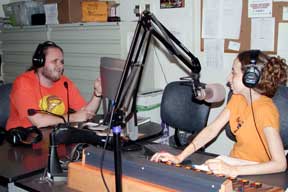A Federal Communications Commission ruling is causing broadcasters to re-examine their use of the “f-word,” but LSU’s Student Media managers say it won’t change the language of their broadcasts.
Ruling against complaints of the Parents Television Council and more than 200 other individuals, the FCC ruled last week in favor of airing the “f-word” on prime-time network television. At the podium during the broadcast of the Golden Globe awards show on NBC in January, Bono, lead singer for U2, said, “This is really, really, f—— brilliant,” which spurred the FCC investigation.
The FCC ruled that the word may be crude and offensive, but in the context presented, did not describe sexual or excretory organs or activities. It was deemed inoffensive because it was used as an adjective to emphasize an exclamation.
Rob Bigalke, adviser to KLSU, said he is disappointed with the FCC’s ruling to allow “four-letter words” to be said as long as they are used as adjectives.
The FCC responds to complaints by the general public, and someone made one. The FCC investigated and decided the phrase “f—— awesome” is not obscene.
“To be obscene, [the f-word] would have to refer to sex,” Bigalke said. “He was using it as an adjective, so it wasn’t ruled obscene.”
Bigalke said this will affect KLSU “none whatsoever” in respect to programming policies, but it is not his decision to make.
“It’s a student-run radio station; they are not my decisions,” Bigalke said. “If I tell somebody they can’t do it, then it’s censorship because I’m a government employee.”
KLSU station manager John Gallent makes KLSU’s decisions and shares Bigalke’s stance on programming policies.
Gallent said though the decision indicates progression of today’s culture, KLSU will not allow it.
“We won’t allow it at any time because it doesn’t show any class,” Gallent said. “Our demographic is age 14-30. If we started that it wouldn’t be a very good example.”
Gallent said KLSU follows “safe harbor,” which is the standard policy by which radio stations abide. The safe harbor time period ranges from 10:30 p.m. to 6 a.m. It allows less censorship of music, but not of the disc jockey.
“We bleep out the seven dirty words and play nothing too violent,” Gallant said.
Gallant said he does not have a problem with the ruling but will not change KLSU’s policies because the station is more family-oriented.
“This is pretty much the dawn of relaxation,” Gallent said. “Go Bono for breaking the rules and not getting caught.”
Michael Hollier, a finance sophomore, agrees with Gallent.
“I don’t think it’s a good thing, on a major network like that,” Hollier said. “[Bono’s] intention wasn’t bad, but it’s not right for a little kid to hear that. It would be OK if it was on HBO or Showtime, but everybody’s watching when it’s on network TV.”
Eric Marshall, KLSU chief announcer and Tiger TV entertainment reporter, said broadcasters are simply “catching up with what people are saying.”
Sherry Palmer, a biological sciences senior, agrees with Marshall but said if they allow all words, they should be allowed in all uses.
“It’s not a big deal. I don’t have a problem with it, but I can see how it is offensive,” Palmer said. “All they did was change the context of the word, but the word has not changed.”
Palmer said it is not too abrasive for children because “they hear it so much they are not really affected by it anymore.”
Tiger TV station manager Meredith Richards agrees with the FCC’s decision but will not change Tiger TV’s programming policies either.
Richards said it is inappropriate to curse at an awards show, but it can be appropriate in other situations.
Richards said that because Tiger TV is not licensed by the FCC, it does not have to follow FCC rules either.
“We don’t censor language with movies, but we don’t curse on original programming,” Richards said.
Richards said there are other reasons Tiger TV workers censor their content.
“We have standards that we set for ourselves, like HBO,” Richards said. “The University would frown upon us cursing, but we select movies like ‘The Big Lebowski’ that curse a lot, because college kids love that movie.”
Media law professor Craig Freeman has mixed feelings about the ruling.
“As a lawyer, I stand by whatever decision the FCC makes on colorful language,” Freeman said. “As a parent, it gives me some concern because I have little children and don’t want them to learn those words. I’m saddened that the FCC doesn’t share my opinion.”
Freeman said the ruling is not as surprising as he initially thought.
“Historically, they try to develop a pattern of ruling that helps future broadcasters plan appropriately,” Freeman said.
Freeman referred to the Branton case, where Peter Branton filed a complaint with the FCC in 1989. NPR’s news show “All Things Considered” ran a report on John Gotti, the alleged leader of an organized crime syndicate. The report featured a tape recording of a wire-tapped phone conversation where Gotti used variations of the “f-word” 10 times.
The ruling of that case said that it was up to the broadcasters to decide how to use the words.
“[The ruling] is a little step forward but not a huge step,” Freeman said.
Un-censoring Sound Waves
October 14, 2003

Un-censoring Sound Waves



